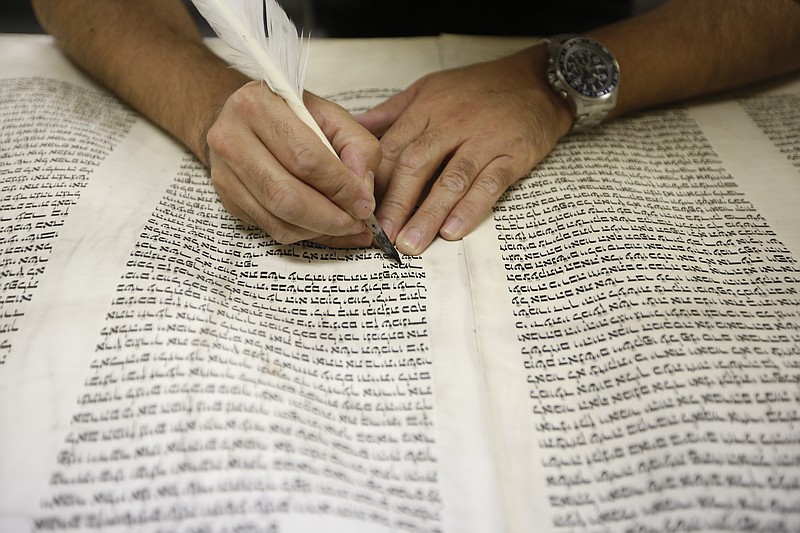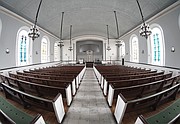Photo Gallery
It hasn't always been simple or easy, but Chattanooga's small Jewish community holds strong
About 15 years ago, Herb Cohn was at a conference in western Massachusetts when another attendee approached him with a question.
"Are there Jews in Chattanooga?"
"I said, 'Yes, there are.' He looked surprised and asked how many and I said about 1,500 and he said, 'I have more than that in my neighborhood,'" Cohn says with a healthy laugh.
Even today, 1,500 is still about the number of Jews in Chattanooga, say those in the Jewish community.
And that figure may be the No. 1 misconception about Jews in the city, says Michael Dzik, executive director of the Jewish Federation of Greater Chattanooga. Most people think the number - which covers the entire metro area - is far higher, he says.
"The joke is that it sometimes includes cats and dogs," he says.
The figure includes each branch of Judaism. While some outside the religion think Jewish people in Chattanooga are a monolithic group, everyone believing the same thing, that's hardly true. Like the division of Christianity into such denominations as Baptist, Methodist, Catholic and others, Judaism is split into three recognized branches - Reform, Conservative and Orthodox - each following their own beliefs, although there is overlap between the three. Messianic Judaism, colloquially known as "Jews for Jesus," is a combination of Judaic and Christian beliefs and is not officially recognized as a branch of Judaism.
And despite the low total number of Jews in Chattanooga, the Jewish community has been a major part of the city for about 150 years, with most coming here after the Civil War to set up businesses such as groceries and clothing and dry goods stores. In 1866, a group of 21 men sat down in a local parlor (the living room) and created Chebra Gamilas Chaced, aka the Hebrew Benevolent Association, which has morphed into Mizpah Congregation.
"Jews have always found a place to pray, a place to worship. Whether it was in a home, in a church that's been loaned to them. You can have a Jewish service anywhere," says the 85-year-old Cohn who, except for a few years while serving in the Navy, has lived in Chattanooga all his life and was the longtime owner of Violet Camera shops.
More than just finding a place to pray, the Jewish community has integrated itself into the blood and bone of Chattanooga. In the late 1800s, the city had two Jewish mayors - George Washington Ochs Oakes and Joseph Wasserman - and many prominent businesses, including Siskin Steel, Effron's Department Store; Harry Miller's Vogue store for women's clothing and Joseph Spitzer's lumber company, among many others. Famous names from the city also include Adolph Ochs, who bought a controlling interest in The Chattanooga Times newspaper in 1878, later purchased The New York Times and eventually created a media empire.
More recently, the roots of CBL & Associates Properties, one of the largest shopping-mall owners in the U.S., were planted here in 1961 by Moses Lebovitz. Current Mayor Andy Berke is Jewish.
In spite of laying so much groundwork in Chattanooga's development, Jews still dealt with prejudice deep into the 20th century.
"How often would you hear the phrase: 'Well, we don't like Jews, but you're different'?" says Karen Diamond, a member of Mizpah.
Yet sometimes the bias came from other Jews.
Not welcome
Into the 1970s, Jews were ostracized to some extent in Chattanooga, not allowed to join some country clubs and not welcome in some neighborhoods.
"Even up until the early 1960s, the major country clubs in town and several neighborhoods in town were what we called 'restricted,'" Diamond says.
"Restricted" meant no Jews - not a quota allowing a certain number of Jewish members, simply none at all, says Diamond, who came to Chattanooga in 1964 after marrying her first husband, David, and, as she puts it, earning her "MRS" degree (as in "Mrs." Diamond).
Sonia Young, known about town as "the Purple Lady," a name she happily embraces, recalls that her husband, Melvin, "was blackballed by one of them."
The local Jewish community hoped he "would break the barrier" since he was a graduate of West Point University and a well-known accountant in town, the 82-year-old Young says. But he ran into the familiar wall, she says, and was turned down. About 10 years later, the same country club approached him and asked him to join, although Young insists the club only wanted her husband's membership fees.
"When they begged him to join, he said, 'You didn't like me then, and I don't like you now,'" she recalls.
The Edgewood Country Club at the intersection of Belvoir Drive and Brainerd Road was created so Jews would have their own place to socialize, says Cohn, another Mizpah member who graduated from McCallie School in 1949 and says he was the only Jewish student in a class of about 90. Edgewood eventually broke up after other country clubs in the area began admitting Jews.
Reuben Dubrow, 89, grew up in the Cameron Hill neighborhood, where the BlueCross BlueShield of Tennessee headquarters now sits, and says he didn't experience the same level of anti-Semitism.
"Believe it or not, I never faced it," says Dubrow, a pediatric dentist. "I don't remember bullying or anybody ever saying anything It must've been present, but I just never came in contact with it."
A member of B'nai Zion Congregation, he acknowledges that his family and neighbors owned small-scale businesses such as grocery stores, so they weren't country-club types who would've run into the no-Jews policies.
School boards in the Chattanooga area also had their own issues with Judaism. In the 1970s, some Hamilton County schools had Bible study classes, but there were not reciprocal classes for Jewish students.
"With the Jewish students they would say, 'If you don't want to stay, you go stand out in the hall,'" Diamond says.
Cohn says his son and daughter, who attended Rivermont Elementary School, didn't stay in class when Bible study came around. At one point, another student told his daughter: "Your brother must've gotten into trouble because I saw him sitting out in the hall.'
"It separated you and made you different in a very negative way," he says.
Dzik, 44, says he experienced more of what he calls "ignorance, not hatred" when he was a student at Tyner Junior High and Tyner High schools in the 1980s.
"They'd say, 'You don't believe in Jesus' or 'You're going to hell,'" he recalls. "They also thought Jews are cheap, so they would throw coins at me."
There also were neighborhoods where - unofficially - Jews weren't welcome to live. Young says that, in the 1950s, her parents tried to buy a home on the exclusive Minnekahda Road in North Chattanooga, but other homeowners "would not have them; they would not sell it to them." They eventually found a house on nearby - but less-chic - Crestwood Drive, she says.
Such attitudes were not unique to Chattanooga, however.
"Even in my hometown in Ohio, we'd say, 'Why look for a house there? They're not going to sell it to you,'" Diamond recalls.
Changing times
Little by little, decade by decade, however, those exclusions disappeared, often because the people who held onto them disappeared, too.
"Old blood died and, all of a sudden, those barriers went down," Cohn says.
Diamond says her daughter graduated from Notre Dame High School in 1983 and never experienced any prejudice while at the private school.
But they admit that, throughout the history of Chattanooga, Jews haven't always been terribly interested in venturing out beyond their comfort zones.
"I don't think they mingled," says Diamond.
"They really didn't," Cohn acknowledges. Jewish people mostly stuck with Jewish people, centering their social life around the other members of their synagogue "because they feel more comfortable," he says.
And while keeping to themselves, Jews developed their own prejudices. From the 1940s through the '70s, members of the various congregations in town, including Mizpah and B'nai Zion, didn't associate with each other. It simply wasn't done.
"I remember that a member of Mizpah married someone from B'nai Zion, and my parents talked about her marrying out of the faith," Young says. "I was always appalled. I thought, 'Shouldn't we stand together?'"
Dubrow says "we had nothing to do with Mizpah."
When he was in public school, he recalls asking an uncle why the kids from Mizpah went to private schools such as McCallie and Baylor. His uncle replied, "They have to go to school there because there's really something wrong with them." The memory elicits a colossal laugh from Dubrow.
Dzik points to a move by the Jewish Federation in the 1990s as a major step in knocking down those congregational walls. The federation created a program in which children from both Mizpah and B'nai Zion got together on Sundays to learn about Jewish history, the Hebrew language and other subjects.
"It really broke down a lot of the barriers, eliminated a lot of the turf issues. It opened up the doors. You had kids who wanted to spend the night at Billy's house and Billy belonged to another congregation," says Dzik, who has two daughters enrolled at East Hamilton High School.
Like the prejudices that disappeared as the non-Jewish population died off, the same was true with Jews, Cohn says.
"In many cases, the new generation looked at it differently," he says. "They're welcoming to interfaith marriages; they don't care who is and who isn't Jewish."
Young acknowledges that "there will always be anti-Semitism and racism in Chattanooga, but now it's more subtle and there's not as much."
"I love this city; there's no place I'd rather be on Earth than Chattanooga," she says. "There have been so many changes here that are so good. The restrictive [neighborhood] covenants, the country club thing, all those things that divided us are gone for the most part.
"Things like the end of segregation and intermarriage of faiths - I've seen all the things that I didn't think would happen have happened. And that's a good thing."
Contact Shawn Ryan at sryan@timesfreepress.com or 423-757-6327.

